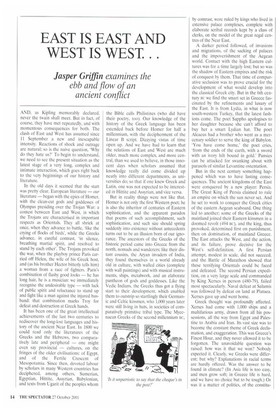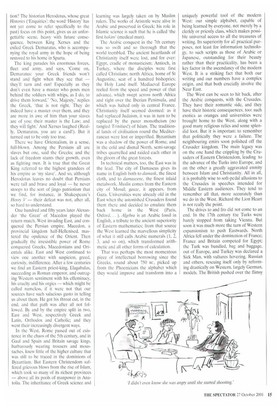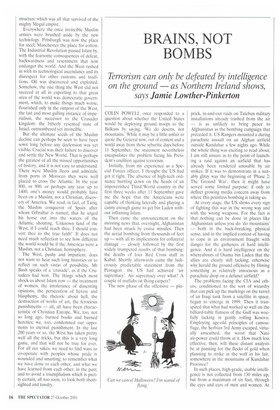EAST IS EAST AND WEST IS WEST . .
Jasper Griffin examines the
ebb and flow of an ancient conflict
AND, as Kipling memorably declared, never the twain shall meet. But in fact, of course, they have met repeatedly, and with momentous consequences for both. The clash of East and West has assumed since 11 September a new and inescapable intensity. Reactions of shock and outrage are natural; so is the naive question, 'Why do they hate us?' To begin to understand, we need to see the present situation as the latest stage of a very long, complex and intimate interaction, which goes right back to the very beginnings of our history and literature.
In the old days it seemed that the start was pretty clear. European literature — our literature — began with the epics of Homer, with the clean-cut gods and goddesses of Olympus presiding over the Trojan War: a contest between East and West, in which the Trojans are characterised in important respects as Orientals. They all shriek at once, when they advance to battle, 'like the crying of flocks of birds', while the Greeks advance, in careful contrast, 'in silence, breathing martial spirit, and resolved to stand by each other'. The Trojans provoked the war, when the playboy prince Paris carried off Helen, the wife of his Greek host, and (as his brother Hector bitterly tells him) a woman from a race of fighters. Paris's combination of flashy good looks — he has long hair, he is a musician: we immediately recognise the undesirable type — with lack of public spirit and reluctance to stand up and fight like a man against the injured husband: that combination marks Troy for defeat and destruction at Greek hands.
It has been one of the great intellectual achievements of the last two centuries to rediscover the long-lost languages and history of the ancient Near East. In 1800 we could read only the literatures of the Greeks and the Hebrews, two comparatively late and peripheral — one might even say provincial — cultures, on the fringes of the older civilisations: of Egypt, and of the Fertile Crescent of Mesopotamia. Since then, devoted labour by scholars in many Western countries has deciphered, among others, Sumerian, Egyptian, Hittite, Assyrian, Babylonian, and texts from Ugarit of the peoples whom the Bible calls Philistines (who did have their poetry, too). Our knowledge of the history of the Greek language has been extended back before Homer for half a millennium, with the decipherment of the Linear B script. Dizzying vistas of time open up. And we have had to learn that the relations of East and West are much older, much more complex, and more central, than we used to believe, in those innocent days when scholars assumed that knowledge really did come divided up neatly into different departments, as universities do; so that if one knew Greek and Latin, one was not expected to be interested in Hittite and Assyrian, and vice versa.
But in reality things were not like that. Homer is not only the first Western poet; he is also the inheritor of centuries of Eastern sophistication, and the apparent paradox that poems of such accomplishment, such sophistication, and such size should spring suddenly into existence without antecedents turns out to be an illusion born of our ignorance. The ancestors of the Greeks of the historic period came into Greece from the north, nomads and wanderers; like their distant cousins, the Aryan invaders of India, they found themselves in a world already old in culture, with walled cities (complete with wall paintings) and with musical instruments, ships, metalwork, and an elaborate pantheon of gods and goddesses. Like the Vedic Indians, the Greeks thus got a flying start to their development, which enabled them to outstrip so startlingly their Germanic and Celtic kinsmen, who 1,000 years later were still living in huts, in societies of comparatively primitive tribal type. The Mycenaean Greeks of the second millennium BC,
by contrast, were ruled by kings who lived in extensive palace complexes, complete with elaborate scribal records kept by a class of clerks, on the model of the great regal centres of the Near East.
A darker period followed, of invasions and migrations, of the sacking of palaces and the impoverishment of the Aegean world. Contact with the high Eastern cultures was for a time largely lost; but so was the shadow of Eastern empires and the risk of conquest by them. That time of comparative seclusion was to prove crucial for the development of what would develop into the classical Greek city. But in the 6th century BC we find the smart set in Greece fascinated by the refinements and luxury of the East. It is from Lydia, in what is now south-western Turkey, that the latest fashions come. The poet Sappho apologises to her daughter because she can't afford to buy her a smart Lydian hat. The poet Alcaeus had a brother who went as a mercenary soldier to serve the king of Babylon. 'You have come home,' the poet cries, 'from the ends of the earth, with a sword with an ivory hilt bound in gold.' Pansies can be attacked for swanking about with parasols of similar Levantine ostentation.
But in the next century something happened which was to have lasting consequences. The ancient kingdoms of the East were conquered by a new player: Persia. The Great King of Persia claimed to rule an empire on which the sun never set. And he set to work to conquer the Greek cities of the eastern Aegean seaboard. One thing led to another; some of the Greeks of the mainland joined their Eastern kinsmen in a doomed revolt (494 BC), and the king, thus provoked, determined first on punishment, then on domination, of mainland Greece. The East attacks the West, and the action, and its failure, prove decisive for the West's self-definition. A first Persian attempt, modest in scale, did not succeed, and the Battle of Marathon showed that these terrifying Orientals could be faced and defeated. The second Persian expedition, on a very large scale and commanded by King Xerxes in person (480-79), failed most spectacularly. Naval defeat at Salamis was followed by defeat on land at Plataea. Xerxes gave up and went home.
Greek thought was profoundly affected. Xerxes had come with 1.000 ships and a multifarious army, drawn from all his possessions, all the way from Egypt and Palestine to Arabia and Iran. Its vast size was to become the constant theme of Greek declamation, and exaggeration. This was Greece's Finest Hour, and they never allowed it to be forgotten. The unavoidable question was raised: how was it that we won? Nobody expected it. Clearly, we Greeks were different; but why? Explanations in racial terms are hardly offered. Was the answer to be found in climate? (In Asia life is too easy, and men grow soft; in Greece life is hard, and we have no choice but to be tough.) Or was it a matter of politics, of the constitu tion? The historian Herodotus, whose great Histories (Enquiries': the word 'History' has not yet come to refer specifically to the past) focus on this point, gives us an unforgettable scene, heavy with future conse quence, between King Xerxes and the exiled Greek Demaratus, who is accompanying the royal army in the hope of being restored to his home in Sparta.
The king parades his enormous forces, fleet and army, and says, 'Come on, Demaratus: your Greek friends won't stand and fight when they see that they'll turn and run! Especially as they don't even have a master who posts men behind the soldiers with whips, as I do, to drive them forward."No, Majesty,' replies the Greek, 'that is not right. They do indeed have a master over them, and they are more in awe of him than your slaves are of you; their master is the Law; and they will fight.' And Xerxes laughed (Really, Demaratus, you are a card!). But it turned out to be only too true.
There we have Orientalist-1i, in a sense, full-blown. Among the Persians all are slaves but one, said the Greeks; and the lack of freedom stunts their growth, even as fighting men. It is true that the Great King referred to the highest grandees of his empire as 'my slave'. And so, although Herodotus leaves no doubt that Persians were tall and brave and loyal — he never stoops to the sort of jingo patriotism that we find, for instance, in Shakespeare's Henry V — their defeat was not, after all, so hard to understand.
One hundred and fifty years later Alexander 'the Great' of Macedon played the return match. West invading East, and conquered the Persian empire. Macedon, a provincial kingdom half-Hellenised, mastered the opulence of the Orient. Then gradually the irresistible power of Rome conquered Greeks, Macedonians and Orientals alike. East and West continued to view one another with suspicion, greed, curiosity, indifference. After a few centuries we find an Eastern priest-king, Elagabalus, succeeding as Roman emperor, and outraging Western sentiment with his effeminacy, his cruelty and his orgies — which might be called nameless, if it were not that our sources have such salacious gusto in telling us about them. He got his throat cut, in the end, and that path was after all not followed. By and by the empire split in two, East and West, respectively Greek and Latin, Orthodox and Catholic; and they went their increasingly divergent ways.
In the West, Rome passed out of existence in the chaos of the 5th century, and in Gaul and Spain and Britain savage kings, barbarously wearing trousers and moustaches, knew little of the higher culture that was still to be traced in the dominions of Byzantium. But Eastern Christendom suffered grievous blows from the rise of Islam, which took so many of its richest provinces — above all its pools of manpower in Anatolia. The inheritance of Greek science and learning was largely taken on by Muslim rulers. The works of Aristotle were alive in Arabic and preserved in Greek; his role in Islamic science is such that he is called 'the first hakirn' (medical man).
The Arabic conquest in the 7th century was so swift and so thorough that the world trembled. The ancient heartlands of Christianity itself were lost, and for ever: Egypt, cradle of monasticism: Antioch, in Turkey, where the disciples were first called Christians; north Africa, home of St Augustine, seat of a hundred bishoprics; the Holy Land itself. Mediaeval Europe reeled from the speed and power of that advance, which swept across north Africa and right over the Iberian Peninsula, and which was halted only in central France. Christianity itself seemed doomed: as it had replaced Judaism, it was in turn to be replaced by the purer monotheism (no tangled Trinities!) of Islam. The traditional lands of civilisation round the Mediterranean were lost or imperilled. Byzantium was a shadow of the power of Rome; and in the cold and dismal North, semi-savage tribes quarrelled and raided each other in the gloom of the great forests.
In technical matters, too, the East was in the lead. The city of Damascus gives its name in English both to damask, the finest cloth, and to damascene, the finest inlaid metalwork. Muslin comes from the Eastern city of Mosul; gauze, it appears, from Gaza. Universities were already old in the East when the astonished Crusaders found them there and decided to emulate them back home in the West (Paris, Oxford... ). Algebra is an Arabic fossil in English, a tribute to the ancient superiority of Eastern mathematics: from that source the West learned the marvellous simplicity of what it still calls Arabic numerals (1, 2, 3, and so on), which transformed arithmetic and all other forms of calculation.
That was perhaps the most momentous piece of intellectual borrowing since the Greeks, round about 750 BC, picked up from the Phoenicians the alphabet which they would improve and transform into a
uniquely powerful tool of the modern West: our simple alphabet, capable of being learned by everyone, not merely by a clerkly or priestly class, which makes possible universal access to all the treasures of writing. Its superiority for all practical purposes, not least for information technology, to such scripts as those of Arabic or Japanese, outstanding for their beauty rather than their practicality, has been a key factor in the ascendancy of the modern West. It is a striking fact that both our writing and our numbers have a complex origin, and that both crucially involve the Near East.
The West can be seen to hit back, after the Arabic conquests, with the Crusades. They have their romantic side, and they have their historic consequences, too: such exotica as oranges and universities were brought home to the West, along with a good many religious relics and some splendid loot. But it is important to remember that politically they were a failure. The neighbouring emirs soon polished off the Crusader kingdom. The main legacy was on the one hand the crippling by the Crusaders of Eastern Christendom, leading to the advance of the Turks into Europe, and on the other a greatly aggravated enmity between Islam and Christianity. All in all, it is probably wise to soft-pedal allusions to the Crusades in speeches intended for Middle Eastern audiences. They tend to remember all that, more accurately than we do in the West. Richard the Lion Heart is not really the point.
The drives to and fro did not come to an end. In the 17th century the Turks were barely stopped from taking Vienna. But soon it was much more the turn of Western expansionism to push Eastwards. North Africa fell under the domination of France; France and Britain competed for Egypt; the Turk was bundled, bag and baggage, out of Europe, and Turkey was declared a Sick Man, with vultures hovering, Russian and others, rescuing itself only by reforming drastically on Western. largely German, models. The British pushed over the flimsy structure which was all that survived of the mighty Mogul empire.
Everywhere the once invincible Muslim armies were brushed aside by the new technology. Pittsburgh was now the place for steel; Manchester the place for cotton. The Industrial Revolution passed Islam by, with the fearsome consequences of defeat, backwardness and resentment that now endanger the world. And the West rushed in with its technological ascendancy and its disrespect for other customs and traditions. Oil was discovered and exploited. Somehow, the one thing the West did not succeed at all in exporting to that great area of the world was democratic government, which, to make things much worse, flourished only in the outpost of the West, the last and most galling instance of imperialism, the successor to the Crusader kingdom: the bitterly resented state of Israel, outnumbered yet invincible.
But the ultimate seeds of the Muslim decline can perhaps be seen to have been sown long before any declension was yet visible. Crucial was their failure to discover and settle the New World. That is perhaps the greatest of all the missed opportunities of history, and it is not easy to understand. There were Muslim fleets and admirals; from ports in Morocco they were well placed to cross the Atlantic. In the year 800, or 900, or perhaps any year up to 1400, one's money would probably have been on a Muslim, not a Christian, discovery of America. We read, in fact, of Tariq, the Muslim conqueror of Spain after whom Gibraltar is named, that he urged his horse out into the waters of the Atlantic, shouting, 'Unknown land of the West, if I could reach thee, I should convert thee to the true faith!' It does not need much reflection to see how different the world would be if the Americas were a Muslim, not a Christian, hemisphere.
The West, pushy and impatient, does not want to hear such long histories or to reflect on such vistas of possibility. Mr Bush speaks of a 'crusade', as if the Crusaders had won. The things which most shock us about Islam now — the treatment of women, the intolerance of dissenting opinions, the persecution of heresy and blasphemy, the rhetoric about hell, the destruction of works of art, the ferocious punishments — all, all have been characteristic of Christian Europe. We, too, not so long ago, burned books and burned heretics; we, too, condemned our opponents to eternal punishment. In the last 200 years or so, the West has taken pretty well all the tricks, but this is a very long game, and that will not be true for ever. For all our sakes, we need to find ways to co-operate with peoples whose pride is wounded and smarting; to remember what we have done to each other, and what we have learned from each other, in the past; and to avoid a triumphalism which is pretty certain, all too soon, to look both shortsighted and tawdry.












































































 Previous page
Previous page